| Part Number | 40.324.200.01 |
| Self-Weight | 105 lbs / 47.63 kg |


No other line array comes close to matching PANTHER’s remarkable output of over 150 dB in such a compact cabinet. PANTHER delivers unrivaled linearity and headroom, only achievable with a self-powered system.
Thanks to a groundbreaking new ultralight Class D amplifier design, PANTHER delivers the same impressive power output yet is lighter than competitive line arrays.

This small loudspeaker lets you dream big. With PANTHER’s sleek, low-profile design, even your most complex production plans will always take center stage.

PANTHER outperforms, out-delivers, and outlasts the competition.
PANTHER’s amplification is built in, so there’s no need to match components, configure crossovers, or deploy a single amplifier. Think of how much you’ll save on storage and transport.
Going greener isn’t just better for the planet, it’s better for business. PANTHER’s compact, power-efficient design means you’ll use less energy at the show. Less weight means quicker load-in/out, less labor, less time, and less energy for transportation. Lower your carbon footprint and lower costs.



Use fewer mobile generators for outdoor events.




Use fewer trucks and pack them more efficiently.
Any way you look at it, PANTHER leads the pack.
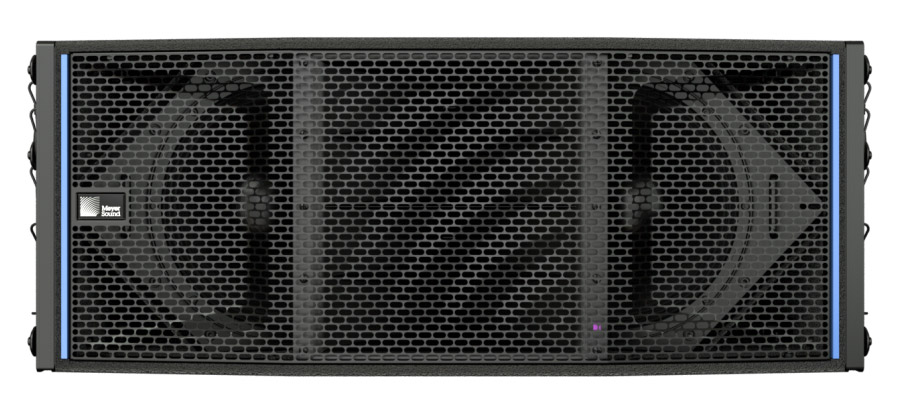
Find out the advantages of PANTHER. We're glad to answer any questions you may have.
Presenting the line array with over 150 dB output in a cabinet weighing only 150 lb (68 kg). Powerful enough for festivals, yet agile enough to support arenas, theatres, and even corporate AV.
PANTHER’s Class D amplifier and new driver technologies means significantly less weight and a 20% reduction in power draw compared to earlier technologies.
PANTHER integrates with Meyer Sound’s system design, deployment, and management applications, including MAPP 3D, Galileo GALAXY, Compass, Compass Go, and Spacemap Go spatial sound design and mixing tool.
The new MG-PANTHER top grid for trouble-free rigging. A caster frame with anti-tipping forklift safety rails. Single and multi-point rigging options. IP55-rated, UV-resistant cabinet and weather-sealing Neutrik TOP connectors keep out the elements — no rain hoods necessary. Taking advantage of the LYON footprint, PANTHER also works with many LYON accessories.
Take a behind-the-scenes look at Meyer Sound’s newest linear line array loudspeaker and hear from the key players that made PANTHER happen. Join Meyer Sound on the journey of the year-long design, engineering, and production process of PANTHER, which is now anchoring the sound of Ed Sheeran’s “+ – = ÷ x” (“Mathematics”) in-the-round stadium tour.
Versatile for Any VenueThe PANTHER family has three coverage patterns — 80°, 95°, and 110° horizontal patterns — to let designers tailor coverage for a range of applications. The low-frequency response is optimized to pair with the entire Meyer Sound LFC line. | Future-Proof ConnectivityPANTHER is ready to grow within a digital infrastructure. Inputs include a Milan-certified, AVB endpoint for next-gen audio-over-IP solutions, bringing a digital signal path directly to the cabinet. | Go GreenerPANTHER’s low current draw reduces energy consumption, and its small size and light weight mean more economical transport and storage. | The Self-Powered AdvantagePANTHER is self-powered, so there’s no calibrating crossovers, and no struggling with amplifier racks, long cable runs, or extra accessories. |
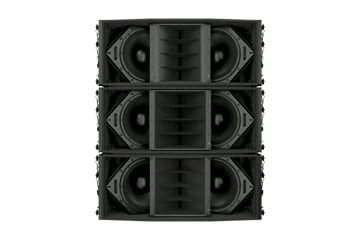 | 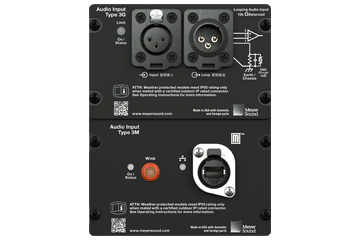 |  | 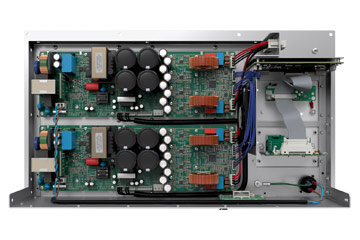 |
Versatile for Any VenueThe PANTHER family has three coverage patterns — 80°, 95°, and 110° horizontal patterns — to let designers tailor coverage for a range of applications. The low-frequency response is optimized to pair with the entire Meyer Sound LFC line. |  |
Future-Proof ConnectivityPANTHER is ready to grow within a digital infrastructure. Inputs include a Milan-certified, AVB endpoint for next-gen audio-over-IP solutions, bringing a digital signal path directly to the cabinet. |  |
Go GreenerPANTHER’s low current draw reduces energy consumption, and its small size and light weight mean more economical transport and storage. |  |
The Self-Powered AdvantagePANTHER is self-powered, so there’s no calibrating crossovers, and no struggling with amplifier racks, long cable runs, or extra accessories. |  |
Meyer Sound has been pioneering self-powered loudspeakers for professional installations and touring since 1995. We’ve committed to self-powered systems because we know they deliver unrivaled clarity, reliable performance, value, and ease of use.
If you’ve been thinking about investing in a self-powered system, you’ve come to the right place.
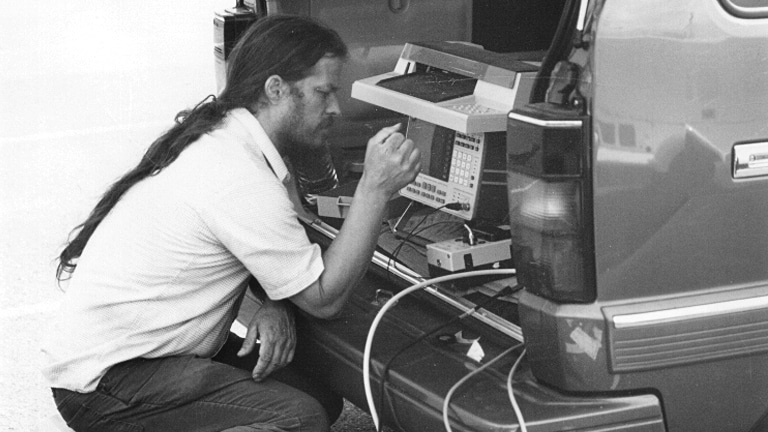
The story of self-powered loudspeakers is in many ways the story of Meyer Sound itself.
In the 1970s, sound reinforcement technology was inconsistent science at best, and at worst, led to show-ending failures. A young John Meyer, designing loudspeakers for San Francisco’s McCune Sound Service, wanted to bring quality and reliability to sound systems, and he knew the answer lay in self-powered loudspeakers. In 1979 Meyer founded his own speaker company; early Meyer Sound innovations include the iconic HD-1 self-powered studio monitor launched in 1989.
Today Meyer Sound offers a full range of self-powered sound reinforcement products. Meyer Sound systems can be found on tour with artists ranging from Ed Sheeran to Metallica, on Broadway and London’s West End, and in performance venues from the San Francisco Opera to the Vienna Philharmonic not to mention sports stadiums, cruise ships, and houses of worship around the world.
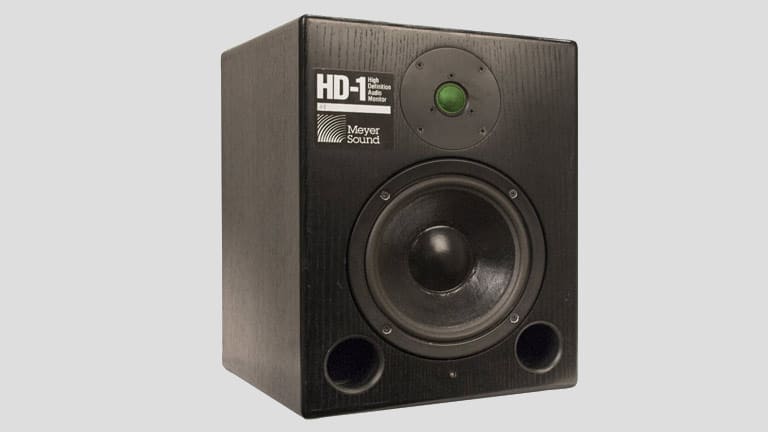
Self-powered loudspeakers offer several advantages over their passive counterparts when it comes to fidelity, reliability, and simplicity. The great part is, you’ll start to reap the benefits of a self-powered system before you even power up.
Ease of deployment: System set-up is so much easier when you have fewer components and fewer cables to worry about being miswired. Since self-powered loudspeakers incorporate amplification, you’ll never have to deal with matching speakers to amplifiers or connecting components. You don’t have to worry about calibration of gain and crossover setting which means more time focusing on the show. Eliminating amp racks doesn’t just streamline system deployment, it streamlines your inventory whether you’re a rental house or a road warrior. And when you consider that the average amp rack weighs nearly 300 pounds and takes up four feet of truck space, the efficiencies get even clearer. Let alone when you want to fly the amplifier racks to get closer to the speakers, often requiring more rigging points and more motors.
Predictable, reliable operation: Internal amplification is closely matched to drivers. Because individual components have been optimized during manufacturing, you can expect consistent sound from show to show. Built-in, factory-optimized protection circuitry provides extra assurance without degrading signal quality. And, when you have less equipment, you have less risk of failure.
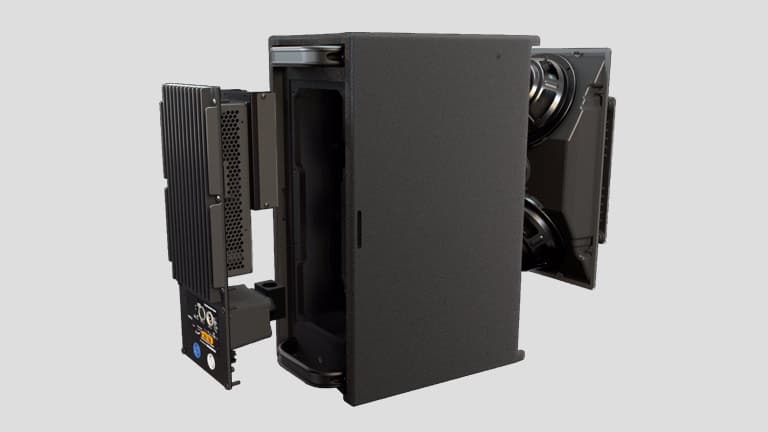
Better frequency and phase response: Because self-powered loudspeakers incorporate sophisticated processing, they are calibrated to exhibit optimal response curves in key performance parameters. Active crossovers are more precise, sophisticated designs, and bi-amped systems are time aligned, eliminating phase issues. The result? Accurate sound throughout the speaker’s range, at any volume level.
Unparalleled clarity: In powered monitors, internal amplifiers are precision-matched to drivers, delivering optimal power at all times for cleaner sound. And because amps are built into loudspeaker cabinets, there’s no need for long lengths of connecting cable, which can become prone to distortion and signal loss.
Tighter transients: Since self-powered loudspeakers have very short internal cables, amps inside can more effectively dampen driver mechanical motion, which leads to better sonic accuracy and tighter, crisper transients. (And, there’s none of the loss in levels and signal quality inherent over long cable distances.)
Certified Safe: Nothing matters more than the safety of your staff and customers. Because self-powered loudspeakers incorporate amplification, they must undergo rigorous testing by Underwriters Laboratories and other international organizations to ensure they operate safely and guard against the risk of fire, electric shock, and inadequate structural design. Enjoy peace of mind knowing Meyer Sound powered products are certified by FCC, UL, CSA, CE, and CEE the most stringent agencies in the business.
What about passive loudspeakers? At first glance, passive systems may seem like a bargain. But we already know that passive systems require more components and accessories than powered systems. Sonically, they exhibit potential for signal loss over distances, and it is very hard to ensure consistent, optimal sound and volume as amplifiers have many variables to consider when being matched to loudspeakers, such as cable lengths and gauge as well as the number of speakers connected to the amplifier.
Passive systems are often touted as easy to service. But because powered loudspeakers are so complex to design and build, self-powered loudspeakers usually represent the top innovations from leading manufacturers. Better quality translates to better reliability, which means fewer maintenance issues in the long run.
At face value, passive systems might seem less expensive and easier to maintain. But once you start adding in amps, cables, and other components not to mention increased transport and labor costs you’ll find that those savings just don’t add up to a better value.
Once you recognize all of the advantages inherent in self-powered loudspeaker systems, it’s easy to understand why the world’s top venues and productions rely on them to deliver consistently stunning sound.